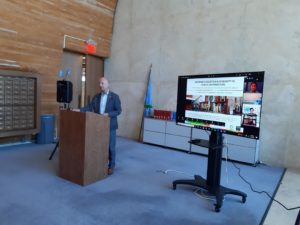Libraries, information and integrity
21 December 2022
As part of IFLA’s engagement at this year’s High-Level Political Forum, the Dag Hammarskjold Library at the United Nations kindly hosted an IFLA session discussing the trends which are shaping how far access to information is enabling sustainable development today. Today we share the report of this event.

The UN Secretary General Antonio Gutteres, in Our Common Agenda – his roadmap setting out the key areas where the UN should focus in the coming years, singled out the importance of integrity.
In that context, this refers to the question of how far citizens can count on the trustworthiness of the information they access and rely on, and what can be done to make sure that this is the case.
This issue has a clear relevance in a number of different spaces – whether the information shared by government can be trusted, whether journalists are abiding by high professional standards, and whether scientific research is carried out and communicated ethically.
A clear common factor here, however, is libraries as key places for people to develop the skills to determine how reliable information is.
Therefore, in order to explore the information trends that should shape any discussion around integrity in the context of the follow up to Our Common Agenda, IFLA organised a session in the margins of the 2022 United Nations High Level Political Forum.
This brought together panellists from five continents and a wide range of professional experiences, all nonetheless having in common the mission to ensure that everyone has access to the information they need in order to achieve their goals.
Key trends identified were:
- Access to quality information is a pre-condition for individual, community and global development
- New barriers and opportunities for providing this are emerging
- The ‘demand side’ of access to quality information matters if we want to achieve results
- Individuals’ needs are different, meaning that we need to enable and support a responsive approach
- The world’s network of >2.5 million libraries represent a key pre-existing resource in this regard
We hope that these collected ideas can represent an early input into the process of defining the planned UN Code of Conduct on Integrity in Public Information, and look forward to working with the United Nations and others to ensure they are understood and integrated into planning.